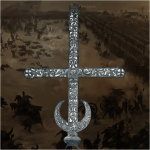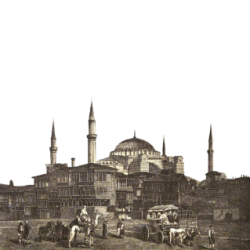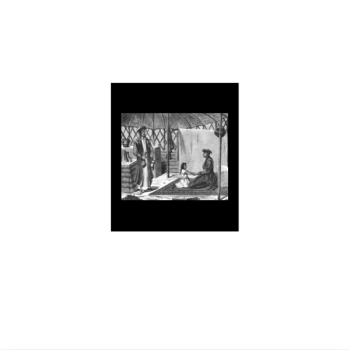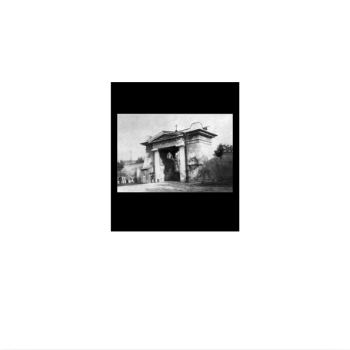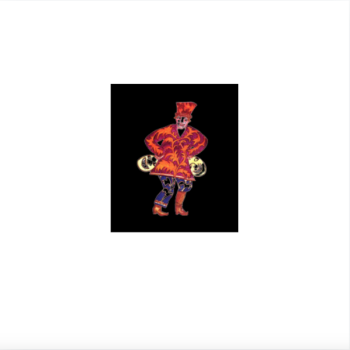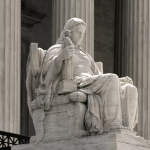“THE BLESSED”
Elena Ivanovna died in March 1824, to the extreme grief of Elena Pavlovna and the rest of the family. The sadness was tempered somewhat later that month with the birth of the couple’s first son Rostislav “Rostya” Andreevich Fadeev.[1]
During the ensuing year, Andrei Mikhailovich was engaged in drawing up instructions for the administration of the colonies. The work according to this program was extensive, but admittedly, not very useful. “For useful service, we need worthy, intelligent people,” Andrei Mikhailovich thought, “not huge instructions.” Kontenius had almost no instructions but was more useful than the executors of the extensive outlines of Count Bludov, Count Kiselyov, and Count Perovsky.[2]
In the summer of 1825, Andrei Mikhailovich accompanied Count Mikhail Semyonovich Vorontsov (the Governor General of Novorossiysk,) and his wife, Countess Elizabeth Branicka, to the colonies. When he returned from traveling in the autumn of that year, Andrei Mikhailovich learned that Tsar Alexander Pavlovich and Tsarina Elizabeth Alexeievna were in Taganrog, where they intended to spend the winter to recover from poor health. He received a baton on October 10, from Count Vorontsov informing him that the Tsar was going to Crimea and would be passing through the Molochnye Vody and therefore asked him to make the necessary preparations. (Vorontsov believed that a tour of Crimea might also attract the loyalty of Muslim subjects in the event of another war with the Ottomans.)[3] Andrei Mikhailovich immediately went to work and did everything that needed to be done.

Tsar Alexander Pavlovich Romanov &
Tsarina Elizabeth Alexeievna Romanova.
The Tsar’s journey was directed from Taganrog through the Mariupol and Nogal settlements. From October 21 to 22, he spent the night at an estate near the Sea of Azov, twenty-five miles from the main colony. The first stop the Tsar made was at the prosperous settlement of Steinbach, a colony founded in 1812 by the minister Klaas Reimer of a Mennonite branch known as the Kleine Gemeinde.[4]
The Tsar, accompanied by Sir James Wylie (the Tsar’s personel physician,) and Generals Afanasy Danilovich Solomka and Hans Karl von Diebitsch, arrived by carriage at noon. Andrei Mikhailovich greeted the Tsar’s party at the entrance of the house of Johann Cornies, one of the elders of the community.[5]
“You would like to ask me, ‘With whom do I have the pleasure of speaking?’” said Andrei Mikhailovich to one of the Mennonite elders.
“Where is Kontenius?” the elders asked.
“In Ekaterinoslav,” replied Andrei Mikhailovich. “Ill health.” With those words, Andrei Mikhailovich presented the Tsar a letter of greeting signed by the spiritual and secular leaders of the colony.[6] The Tsar entered the rooms, called the host and hostess, and graciously greeted them. When the host entered the dining room the Tsar was already sitting at the table. Andrei Mikhailovich was then honored with an invitation from the Tsar.
“You are welcome to sit down,” said the Tsar, continuing to address Andrei Mikhailovich. “What is Kontenius sick with?”
“Chest sickness, Your Majesty,” answered Andrei Mikhailovich.
“And I think old age. How long has the bird flown?”
“Seventy-six years.”
“Bow to him, brother, on my behalf and say that I really regret that I could not see him, especially with regards to the reason why he could not be here. Tell him that I would sincerely wish to give him twenty years, but this is beyond my power.”
Having then asked several questions about General Inzov and other colony leaders, the Tsar asked: “Are there only two houses in this colony?”
“This is not a colony,” answered Andrei Mikhailovich. “It is a farm founded on land granted by Your Majesty to a former Mennonite elder for his diligent public service, and for the founding of the first forest plantation in these places. The current owner of the house is his son-in-law.
“Whose small Little Russian houses are these?” asked the Tsar, pointing out the window.
“The owner’s workers live in them.”
“The Mennonites, it seems, do not build houses in this manner?”
“Not at all, Your Majesty.”
“How many Mennonites came here from Prussia during the past year?”
“Five families.”
“What are the main exercises of the Mennonites?”
“Improved cattle breeding, arable farming, and various crafts.”
“What kind of cattle do they have?”
“For the most part, a mixture of German and Little Russian.”
“And the horses?”
“The Mennonites who originally settled here brought with them cattle and horses from Prussia.”
“What kind of grain do they sow the most?”
“Wheat.”
“Did they lose much last winter from the loss of livestock?”
“A fifth.”
“Did they, like other local residents at that time, remove thatch from their roofs to feed livestock?”
“Some have.”
“Do they have arrears in taxes?”
“Very rarely.”
“Are there factories?”
“One small, cloth one, which Your Majesty deigned to visit in 1818.”
“Ah, yes! I remember.”
“It seems that in 1818 we did not travel here,” said Dr. Wylie.[7]
“Yes,” the Tsar confirmed, “we drove from the Dukhobor village where we spent the night to the village of Tokmak and from there straight to Mariupol.” Then he turned to Andrei Mikhailovich again.
“During the course of my eight-year administration, has there been any important criminal offenses among these Mennonites?”
“One Mennonite ran over a child while drunk.”
The Tsar, making a sign with his head, said: “This is unintentional! Are there really many among them who are prone to drunkenness?”
“Very rarely.”
“These are good people!” Then Tsar then jokingly asked: “Wylie, aren’t you here among your fellow believers, in matters of religion?”
“No, Sire,” answered Wylie, “I belong to the Episcopal Church.”
“And which church do you go to in Petersburg?”
“I attend mass at the Anglican chapel, sire.”
The Tsar continued, turning to Andrei Mikhailovich: “Are they living peacefully? What about the Nogais?”
“The Nogais sometimes bother them a little, but the local authorities are trying in every possible way to stop the willfulness of the Nogais.”
A strong storm began outside.
“Squalls—cast in the same mold as women,” said the Tsar, looking out the window. “Tell me, Andrei Mikhailovich, is the weather here always like this in October?”
“On the contrary, Your Majesty, winds and rains occur here much more often in September. Before and after the equinox. For the most part, with the exception of the morning and evening fog, it is clear, warm, and quiet, in October.”
The Tsar asked Dr. Wylie and General Solomka who they spent the with in Nogaisk, and whether they had good apartments. At this time the Tsar’s cook, Miller, served a dish of greens.
“Are these vegetables from here?”
“No, Your Majesty,” Miller answered, “but I found them here.”
The Tsar then saw the bone knife with which Dr. Wylie had cut the bread. Miller had given it to him from another room. Taking it in his hands, the Tsar studied the inscription. “It says ‘Moscow’ in Latin letters!. Our manufacturers have a passion for writing on their stamps either ‘London’ and ‘Paris,’ sometimes ‘Moscow’ and ‘Petersburg,’ but always, and without fail, in Latin letters!”
“Do you know, Andrei Mikhailovich, if the knife was made here?” asked Dr. Wylie.
“It was not.”
“Are you aware, Andrei Mikhailovich, of the Swiss gentleman who settled among the Nogais?”
“I know a little.”
“What do you know about him?”
“As far as I know, he seems to have good morals, is honest, and has good intentions.”
“What are they?”
“Well, Your Majesty, he intends to study the character, way of thinking, morals, and spirit of the Nogais. He wants to communicate this information to the Basel missionaries who have the goal in mind to convert the Mohammedens to the Christian faith, to facilitate their success.”
“Yes! That’s right,” said the Tsar. “There is an institute in Basel where missionaries are trained. I wish him success—but I have my doubts.”
The Tsar looked at his watch and got up from the table. He and his staff went to another room. A few minutes later they called for Andrei Mikhailovich and the Mennonite elders.
“Are you happy with everything,” asked the Tsar, addressing the elders. “Have you any complaints?”
“We are happy and satisfied in all respects,” the elders replied. “We can only thank the Emperor for all his generosity and mercies.”
“I am pleased with you for your peaceful life and hard work, but I wish you to establish a forest plantation, especially of American acacias, which grow very successfully in these areas.” Having dismissed the elders, the Tsar called Cornies and his wife into the room to thank them, and generously presented them with gifts.
Andrei Mikhailovich then accompanied the Tsar and his staff to the Mennonite colony of Altona, along the way paying a brief visit to the colonies of Rückenau, Prangenau, Neukirch, and Lichtfelde. At the Orlov colony, horses were changed around one Mennonite house, which differed from the others in its spaciousness and structure. The Tsar got out of the carriage and went alone into the house. The owner of this house, riding in front of the Tsar’s staff, soaking wet with rain, and covered with mud, ran inside to change his caftan. The timid housewife stood huddled at the front door. In another room were Helena and Katya, the daughters of Andrei Mikhailovich, who arrived from Ekaterinoslav with a lady they knew for a chance to see the Emperor. The Tsar entered the room and, seeing them, Alexander Pavlovich approached them and asked them who they were. He then kindly asked the girls about their mother, and whether they had brothers and sisters.
Returning to the front room, the Tsar inquired of the owner (who had now entered the room,) the identity of the shy woman in the corner of the room. Learning that she was the mistress of the house, the Tsar approached the hostess and reached for her hand. Thinking that the Tsar wanted to shake her hand (according to Mennonite custom,) the lady freely extended her hand. The Tsar, however, kissed her hand (according to courtly custom.) This condescension, beyond all hope, struck her so much that she turned pale, staggered back quite a few steps, speechless, and ready to faint.
“How long ago was this house built,” the Tsar asked the owner. “How much did it cost?”
Satisfied with the owner’s answers, the Tsar bowed and left the room, where he saw Andrei Mikhailovich in the hallway.
“Is your family here, Andrei Mikhailovich?”
“My two daughters are here, Sire,” said Andrei Mikhailovich. “They wished to have the happiness of being honored with the sight of Your Majesty.”
“Where is your wife?”
“In Ekaterinoslav, sire.”
“Did your children tell me that she was born Princess Dolgorukaya?”
“That’s correct.”
“What Dolgoruky?”
“Prince Pavel Vasilyevich Dolgorukov.”
“Isn’t he the one who served in the lancers?”
“No, sire. My father-in-law had the good fortune to serve Your Majesty’s august grandmother as a Major General, and he retired at the beginning of the reign of Your Majesty’s father.”
The Tsar raised his eyes, trying to recollect, and then, shrugging his shoulders, said: “I don’t remember.”
“Get into the carriage,” the Tsar told Andrei Mikhailovich. “The gentleman here has a better house than others.”
“He is more sufficient than others.”
“What kind of house is this at the end colonies, opposite the school?”
“A house of prayer.”
“Will it be a plastered?”
“Next year the Mennonites definitely intend to plaster.”
The Tsar nodded his head with a smile of approval.
Upon arrival in the Altona colony, the Emperor entered the house intended for his overnight stay, and immediately called over the owner and his wife, and spoke with them about their household and life.
The next day, October 23, before leaving, the Tsar, having learned that Helena and Katya Andreevna had arrived, ordered them to be brought to him. General Solomka sent for them, and seeing how small they were, reminded them not to forget to bow to the Emperor (which they, of course, did.) The Tsar spoke to them very much, mercifully, jokingly, and asked details about their mother, grandmother, and studies; he embraced them and kissed their hands at parting, and asked them to bow to their mother for him. When leaving, the girls could not open the door, so the Tsar walked around the room and, noticing the difficulty they were having, laughingly approached them and pushed the door open with his foot to let them out. He then called the owner and the hostess of the house and thanked them for the night. He then generously gave them money. He wanted to give the Fadeev girls a present as well, but it turned out that nothing was taken for that purpose on the journey.
Before setting off for his next destination, the Tsar approached Andrei Mikhailovich at the door of the house.
“Thank you, Andrei Mikhailovich,” said the Tsar. “I am very pleased to have met you. Bow to your wife for me.” Then in a voice of paternal complicity, the Tsar asked: “Tell me. Are you happy in your family?”
With a feeling of tenderness and gratitude to the Father Sovereign, Andrei Mikhailovich gave an affirmative answer. The Tsar bowed and stepped into his carriage. At that very moment, one of the Nogai thrust several banknotes of old denomination into the hands of General Diebitsch.
“Ah! This is of old dignity,” said the Tsar, looking at the notes. “It is prohibited by law to exchange them. How many of them are there?”
“Two hundred and fifty rubles,” answered General Diebitsch.
“Give it to him,” ordered the Tsar. He then bowed again and set off for his further journey.

(Left) Sir James Wylie (Center) General Afanasy Danilovich Solomka (Right) General Hans Karl von Diebitsch.
Five miles from the last colony, the Tsar passed through the main Doukhobor village called Terpeniye.[8] The Doukhobor elders were expecting the Tsar with bread and salt, but the Tsar, having learned from the Quakers, William Allen and Stephen Grellet, that the “spirit wrestlers” did not believe in the divinity of Christ (as well as reports of various crimes and disorder among them) looked at them with indignation and ordered the coachman to continue ahead without stopping.[9]
-
- NOVOROSSIYA
- The Arbiter Of Europe’s Destiny.
- The House Dolgorukuy
- Madame Krüdener
- Ekaterinoslav
- The Arabat Arrow
- The Mystery Of General Inzov
- The Doukhobors
- Pushkin
- Chuguev Military Settlement
- “The Blessed”
- The Decembrists
- Penza
- Independence
- Last Words Of Samuel Khristianovich Kontenius
- “Amid Coffins And Desolation”
- Rusalka
- Dead Souls
- Secret Passages
- Astrakhan
- Nevsky Prospekt
- Kalmyk Ulus
- Love And Ambition
- Duellistes
- Pyatigorsk
- A Heroine Of Our Time
- Winter Palace
- Zeneida R-Va
- Steppes
- Letter To Natalya
- Fire And Ice
SOURCES:
[1] Fadeyev, Andrei Mikhailovich. Vospominaniia: 1790-1867. Vysochaishe Utverzhd. Yuzhno-Russkago. Odessa, Ukraine. [Russian Empire.] (1897): Part I: 67
[2] Count Dmitry Nikolayevich Bludov (1785, 1864,) Count Pavel Dmitrievich Kiselyov (1788-1872,) Count Vasily Alekseevich Perovsky (1794–1857.)
[3] Joyneville, C. The Life And Times Of Alexander I: Vol. III. Tinsley Brothers. London, England. (1875): 353.
[4] Friesen, Ralph. Between Earth & Sky Steinbach, The First 50 Years. Derksen Printers. Steinbach, Manitoba, Canada. (2009): 12-20.
[5] Wenger, John Christian. Glimpses Of Mennonite History And Doctrine. Wipf & Stock. Eugene, Oregon. (2000): 97.
[6] The letter read: ”Most Merciful Sovereign: Providence has again granted us the happiness of seeing Your Imperial Majesty, our Most Gracious Sovereign, and Father. Under Your merciful rule, under Your protection we live here happily and peacefully. Receive, Most Holy Monarch, the outpouring of feelings of gratitude, devotion and love. Accept the confirmation of our heartfelt and everlasting prayer to the Almighty: May the Lord crown you, your entire august house, and all your great and beneficent gifts beginning with your blessing.”
[7] Lee, Robert. The Last Days Of Alexander, And The First Days Of Nicholas, Emperors Of Russia. Richard Bentley. London, England. (1854): 43-46.
[8] Fadeyev, Andrei Mikhailovich. Vospominaniia: 1790-1867. Vysochaishe Utverzhd. Yuzhno-Russkago. Odessa, Ukraine. [Russian Empire.] (1897): Part I: 80-88.
[9] Allen and Grellet met Tsar Alexander Pavlovich in February 1819 while on a missionary tour of Russia. [Grellet, Stephen. A Concise Memoir Of The Remarkable Evangelist, Etienne De Grellet. Edward C. Alden. Oxford, England. (1877): 169-173.] In Southern Russia they were escorted through the Mennonite colonies by Kontenius. Both men left impressions of their travels here. Allen writes: “On leaving Orloff we proceeded to Altona, the last of the Mennonite settlements, passing several villages on our way, and were truly gratified to see the neatness of the houses. We lodged with a precious young man, one of their ministers, who, with his wife, gave us a kind and Christian reception; and were in the very room which the Emperor occupied in his visit last year, when he was quite delighted with these people.” [Sherman, James. Memoir Of William Allen. Henry Longstreth. Philadelphia, Pennsylvania. (1851): 282-283.] Grellet writes: “This afternoon we went to the principal village of the Duhobortzi [sic]; they inhabit several others near. We went to the abode of the chief man among them. He is ninety years old, nearly blind, but very active in body and mind. He appears to be a robust, strong man. Fourteen others of their elders or chief men were with him. We had a long conference with them. He was the chief speaker. We found him very evasive in several of his answers to our inquiries. They however stated unequivocally that they do not believe in the authority of the Scriptures. They look upon Jesus Christ in no other light than that of a good man. They therefore have no confidence in him as a Saviour from sin. They say that they believe that there is a spirit in man, to teach and lead him in the right way, and in support of this they were fluent in the quotation of Scripture texts, which they teach to their children; but they will not allow any of their people to have a Bible among them.” [Grellet, Stephen. Memoirs Of The Life And Gospel Labors Of Stephen Grellet: Volumes I & II. Henry Longstreth. Philadelphia, Pennsylvania. (1860): 455-456.]



